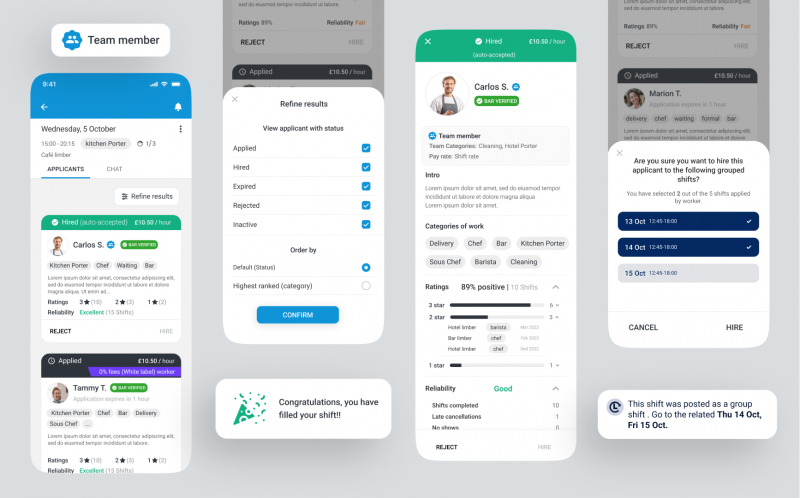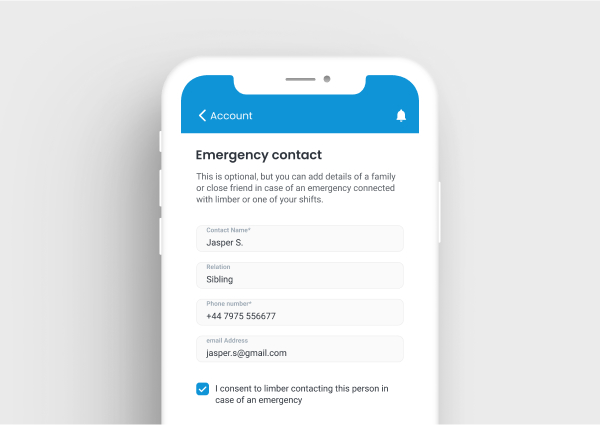The time is nearly here. The Employment (Allocation of Tips) Act 2023 comes into force on 1 October 2024. But should you include your agency or flexible staff in your tipping policy?
We’ll start by defining agency and flexible staff – that’s anyone you hire from a traditional temping agency or from platforms like limber. This doesn’t include self employed people you hire, but if you’re doing that, then you’ve got a bunch of much bigger problems (tax liabilities, immigration problems, holiday pay liability and a PR nightmare waiting to happen).
Please stop doing this. Please seek legal advice. Do not pass go. Do not collect £200.

As usual, when the government issued their guidance accompanying the legislation, it was vague, caveated and with enough wiggle room for employers and TRONC committees to basically do whatever they want. So we examine your options below.
POV: yes, obviously, agency/flexible staff should be included in tipping policies
If someone works for your business, delights guests and contributes to the collection of tips, then they deserve to be rewarded in the same way. The end.
It’s a nice answer. It’s easy. It’s not all that controversial and it’s probably the simplest thing to do.
But wait. What if the worker is on their first shift and doesn’t know the ropes yet. What message do you send your core teams if someone just drops in and suddenly gets a full share in tips? Is that right or will it sow seeds of discord amongst the troops?
Well, the answer here may lie in whether or not your core teams have a right to tips from day 1. If a new employee does get full rights from day 1, then it’s harder to argue that someone sourced in another way should have it any different.
If we’re splitting hairs, the own sourced staff member might say that they should be invested in more heavily because they’re committing more, but that argument doesn’t really hold up to scrutiny given that they’ll earn more tips by working more shifts (plus what’s to say the core team member doesn’t pack up and leave within 30 days anyway…).
POV: nope, agency/flexible staff aren’t committed to us, they don’t get tips
This will definitely fly if there’s a pay disparity between agency/flexible staff and core teams – ie, if core team members are paid less, then it follows that agency/flexible staff perhaps shouldn’t get a share in tips. But, if you’re routinely paying core teams less than flexible/agency staff, then you need to look closely at that. On limber, you’re in control of what you pay flexible team members, but at some traditional agencies, they will pay (and charge) you a higher hourly rate – and it can also sow discord amongst your core team.
However, where there is no pay disparity, this approach could land you in hot water.
It’s easy to understand why agency/flexible staff might be viewed this way – and yes, they’re hardly committing to climbing the ranks and becoming managers, area managers etc (not yet anyway). But there are some pretty big holes in this argument.
Firstly, who says they’re not committed? A lot of workers on limber (for example) work hard for 3 or 4 employers, on a flexible basis. A lot of them have more skills, experience and/or knowledge than core team members. And every shift they turn up, work hard and get another good rating on their profile.
Secondly, you actively don’t want everyone to be committed to promotion and the long term success of your business. You can’t retain those people over the long term because you haven’t got enough senior roles for them. You need a flexible element of your teams to adjust your labour spend in line with your revenue. Since you need this element of your staff – you shouldn’t view less committed people as less important.
Finally, tips are given because service/quality is good – not because the team have any particular length of tenure somewhere. In fact, customers don’t give a cr*p if staff members have been there 1 day or 1000 – they like what they see and they tip accordingly. So, if service/quality are good, then shouldn’t flexible team members be rewarded for that? Don’t you want to incentivise high quality/service standards? And don’t you want to attract the best flexible staff you can?
Ultimately, as adding a flexible element to your labour becomes more popular, it’s important to invest in that talent pool too. It’s also important to have everyone pulling in one direction. To exclude agency/flexible staff from tips pools will only result in attracting bad flexible staff, which ironically will result in smaller tips pools.
So what’s the right answer?
Of the two options at either end of the spectrum, it’s better to go for option 1 – everyone gets tips, equally. The end.
However, here are some viable alternatives to that blanket approach:
1. agency/flexible staff become eligible after x shifts – although that should closely mirror core team probation periods as they apply to tips.
2. agency/flexible staff get a y% reduction in their tips – although that should closely mirror any other ratios you have for your own team.
3. agency/flexible staff who are part of the limber team (ie have been rated highly), get a share in tips. [this one is admittedly relevant to limber only]
4. agency/flexible staff get a share in tips if their performance is good – although beware – this will be incredibly difficult to track [unless you’re using limber of course].
This will be an evolving area, but an interesting one. Being fair and transparent and showing your logic that underpins your tipping policy will be the most important thing – regardless of where you land.
If you’d like to learn more about how an effective flexible pool of talent can help your hospitality sites become more profitable places, please get in touch with limber.




